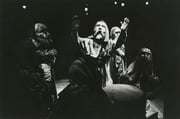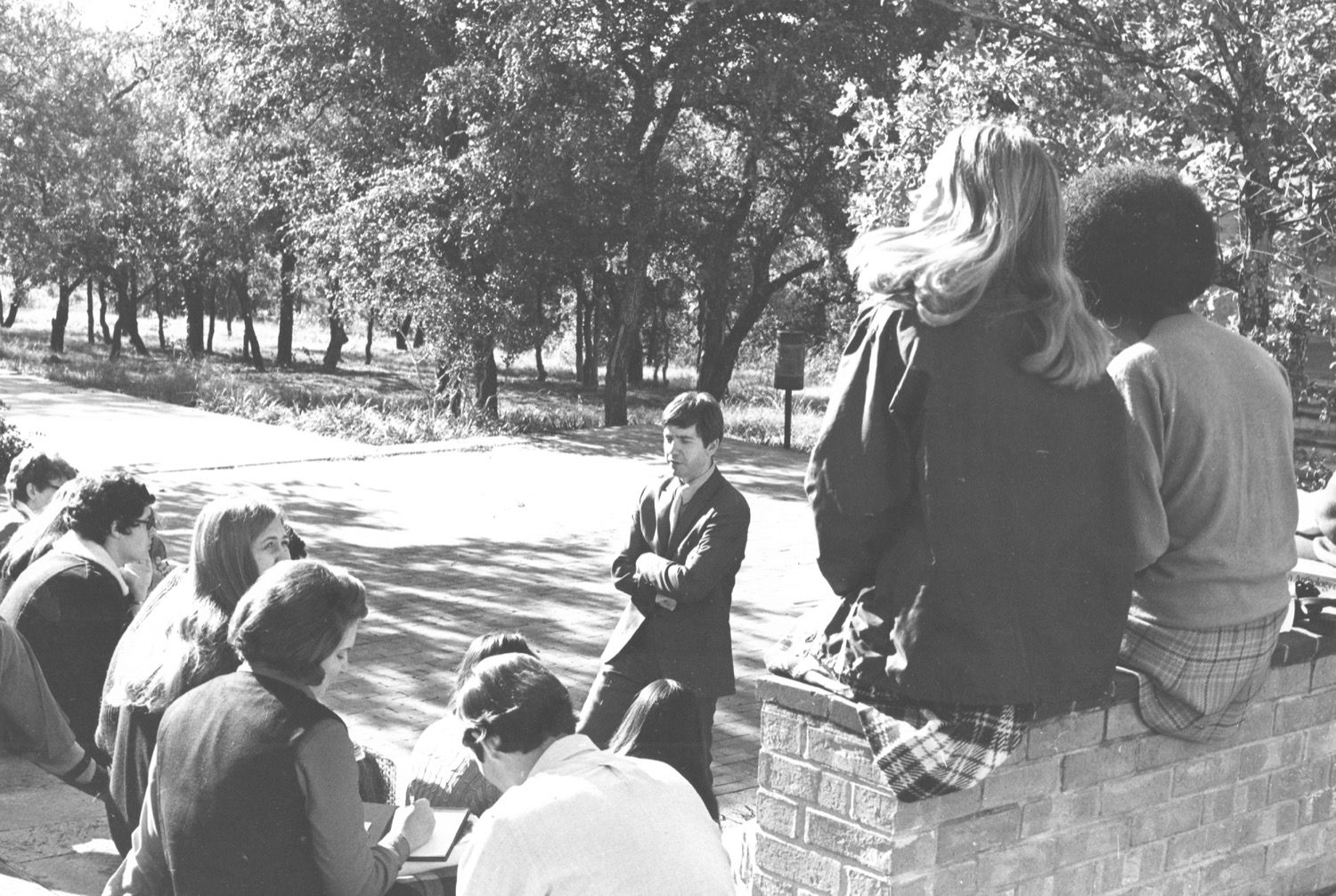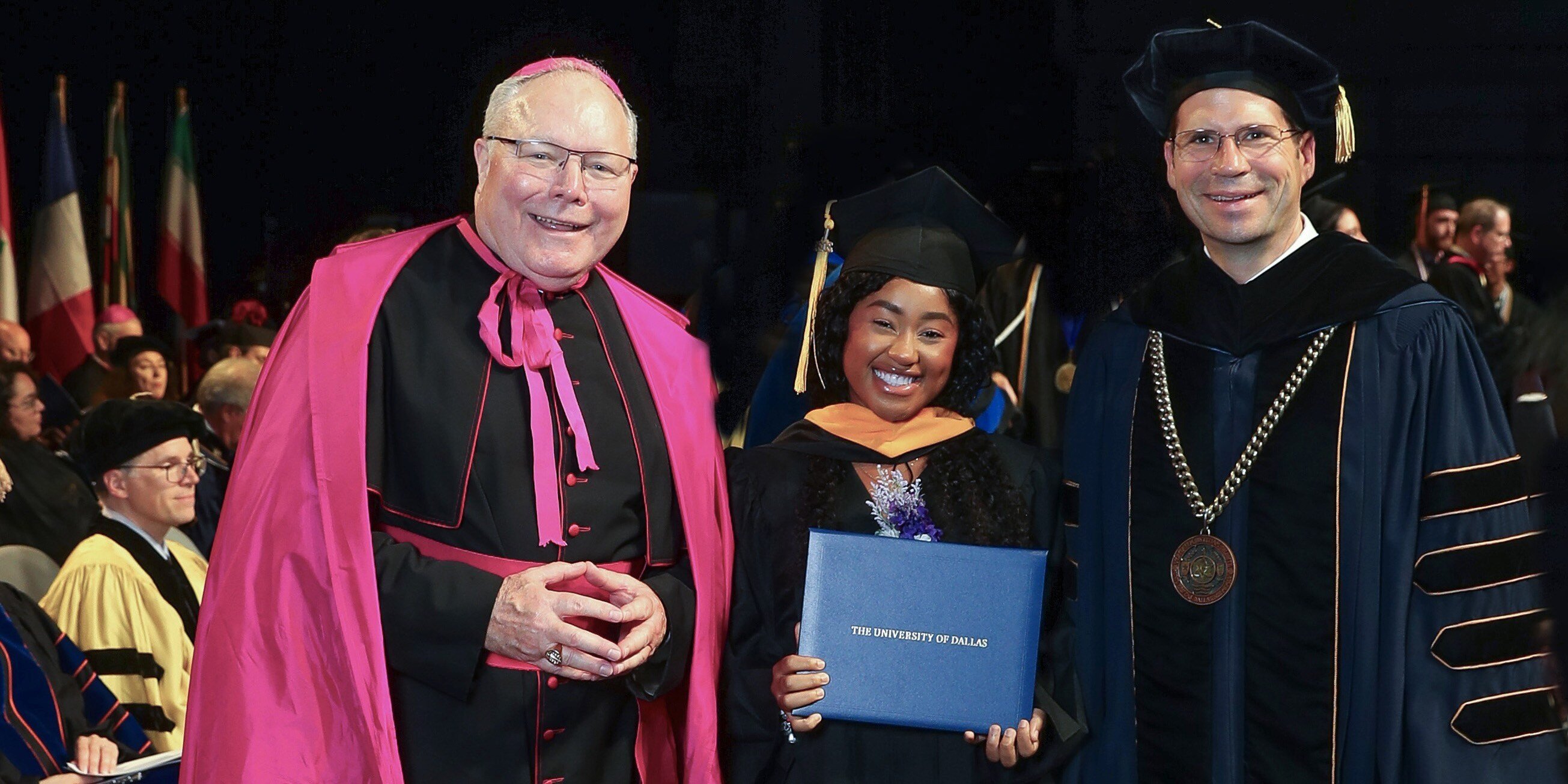CIVIL DISCOURSE
An Interview With President Jonathan J. Sanford, Ph.D.
How does one cultivate civil dialogue and debate in today's culture? What place does UD occupy in higher education today? How are UD graduates different?
This edited excerpt from Anchored, a podcast produced by the Classic Learning Test (CLT) and hosted by CLT CEO Jeremy Tate, discusses these questions and more with President Jonathan J. Sanford.
JT: Let's talk about the University of Dallas, one of the most popular destinations for CLT test takers. What makes this place special?
JS: That's a great question. What makes UD special is really the classroom experience. That's at the heart of it, and I sometimes think about this in terms of what's missing in our broader culture.
We do see people agitating a lot, and we see a lot of shouting past each other. We see a loss of what G.K. Chesterton calls the art of arguing without quarreling. They can't hide behind a screen. They’re engaged in a classroom where they are compelled, whether they like it or not, to offer an interpretation of “The Iliad,” offer an interpretation of Austen’s novel “Pride and Prejudice,” so you can't hide. There's a lot of writing, and we're convinced that one learns to think clearly by writing well.
And one learns to write well in part through engaging in conversation with others. The tradition itself is ... sometimes called an extended argument; that's what the philosopher Alasdair McIntyre refers to [as] the Western intellectual tradition, the Catholic intellectual tradition. And he's right about that. It’s a tradition of conflict. We've got Plato, who was very nervous about the influence of Homer. We've got Aristotle, who rejects some of Plato’s own positions. Learning how to understand the position of your interlocutor, and being able to articulate their position, optimally even better than they do, is critically important to cultivating this art of arguing without quarreling.
In addition to all kinds of other clubs and activities we have, at the heart of the University of Dallas is its Catholicism and shared liturgy. We've got masses every day, a Cistercian monastery nearby, a Dominican priory on campus and a minor seminary for the diocese. We're building a convent for the Nashville Dominicans who teach for us. So, all of these different currents ... are flowing into the university. The divine liturgy is at the heart of it, but ... the place is unified [around] intellectual formation.
JT: [From] a lot of the parents we connect with at CLT, we hear an overall frustration with … the loss of Catholic identity, also [a lack of] any kind of a serious core curriculum. How has UD been able to, from an outsider perspective, at least, avoid mission drift?
JS: I would say that perspective is accurate. We've avoided mission drift by saying no to some things. It's hard to fit certain degree programs into a four-year structure if you have a two-year, integrated Core Curriculum, and that's just a bullet we're happy to bite. ... It's what makes us distinctive in part, but it means that if you want to be a nurse, we've got a pathway for you to work with another university to become a nurse through being a biology major here, but there will be additional coursework beyond what you would typically complete within four years. Similarly, we've got four-plus-one arrangements for engineering.
Our most popular undergraduate major for the first two years is what we call undeclared. … We've got a lot of seekers. That might seem counterproductive, but here [they can] explore the full array of disciplines, see what is really attractive, what they want to dig into and major in.
JT: I want to hear a little bit about this Rome program, because it is one of the most epic study abroad opportunities. It sounds like most students do it.
JS: Over 80% of our students [participate in the Rome semester abroad], and I would love to see 100% of our students do it. The program is unique in a lot of ways. One of those ways is that the coursework there is part of the Core Curriculum itself. You're just outside of Rome, so Europe becomes a hu-manities laboratory, so to speak. The eternal city is the eternal city for a reason, right? It's where Athens and Jerusalem converge in a particular way.
JT: Let's talk about the graduate program … especially for teachers who really want to master the craft of being a great teacher in a classical school. Can you tell us a little bit about the mission and the focus of the program?
JS: The program is designed to take one's education to the next level. It is very popular with teachers. We’ve seen enormous growth there over the last five years, and it's born from our Braniff Graduate School of Liberal Arts, where we hold Ph.D. programs in philosophy, politics and literature, and many other master's programs. That graduate school has always been an incubator of new ideas, and one of the founders is Louise Cowan, the great literature professor. She saw graduate school as providing an opportunity to teach the teachers.
JT: One of the virtues or the great things about UD is that it doesn’t seem to change when everything else seems to be changing. But what is your vision for the next five or ten years in leading the university? What place do you hope UD occupies in American higher ed in the future?
JS: I would say UD has changed in some ways. We’re much more deliberate about finding ways for students to land internships, to explore career options. It’s become a great priority of this university to make sure that we do everything we can so that students can land on their feet. A great number of our students do go on to graduate studies. For instance, we've got exceptionally high medical school placement rates and law school placement rates.
The University of Dallas, I'm convinced, is the best Catholic liberal arts university. We provide the paradigm. There's something about the curriculum, the level of the commitment of our faculty to their disciplines that fosters a sense of wanting to do great things for the greater glory of God, and that translates into wanting to sanctify your life of work through applying the gifts that you have, the education that you have received. Our graduates rise quickly within corporations, or become attorneys of real significance … they are not just Catholic doctors, but the best doctors who are Catholic as well.
This goal of being really excellent in all that you do, how you raise your family, how you build up your community, that’s fostered by the education we provide. It's very much a part of our DNA, and I do think it is one of the distinguishing features of the University of Dallas.




